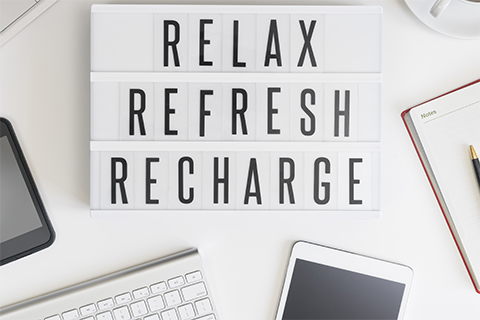The Benefits of Short, Scheduled Breaks in a Practice Setting
By Practice Growth February 21, 2020
The benefits of taking regular breaks at work are well-researched and widely accepted among many of the world’s most successful companies. If you’re an employee, you may worry that your employer will question your work-ethic if you take frequent breaks. If you’re an employer, paying your employees to do something that’s not related to work may seem absurd. Research shows, however, that when employees take regular breaks at work, everyone reaps the rewards.
The Benefits of Taking Breaks at Work
 For Employees
For Employees
Employees who don’t take breaks at work are more likely to report feeling stressed, unhappy, and exhausted, but the risks of not taking breaks at work aren’t just psychological - they’re also physical. Long periods of uninterrupted sitting put you at higher risk of heart disease, diabetes, and obesity. Short breaks - even those that only last a few minutes - have been shown to mitigate these risks.
For Employers
Intuitively, it may seem that frequent breaks will decrease overall practice productivity. Evidence shows, though, that employees who take breaks at work are more dedicated, productive, and motivated. When your employees take regular breaks, they accomplish more in less time, make fewer mistakes, are more likely to stick around, and are less likely to suffer injuries in the workplace. As an employer, all those factors result in long-term cost savings. Comradery and team satisfaction are crucial to practice growth.
For Patients
Patients don’t need to spend a lot of time in the practice setting to sense and understand the environment. When practice staff are friendly and happy at work, patients are more likely to perceive their outcome as favorable. In fact, several studies show that overall staff attitude is the number one determinant of patient satisfaction.
Easy Ways to Take a Break at Work Without Sacrificing Productivity
Get Active

If you’re losing focus at work, take a short break to engage in physical activity. Exercise - even in small amounts - can help you stay alert and focused. You don’t need to break a sweat. If you work in a walkable area, take five minutes to stretch your legs when you feel your mind drifting.
Change Your Scenery
If you spend your break sitting at your desk, you may find it difficult to pause your work tasks or switch your brain to rest mode. Take advantage of longer breaks by unwinding at a nearby coffee shop or a neighborhood park.
Eat a Light Snack
Don’t limit snacking to your lunch break. Refuel throughout the day with light, nutritious snacks. Opt for low-sugar foods that won’t make you crash later in the day. Nuts, granola, yogurt, and baked veggie chips are all excellent options.
Meditate
Meditation is the ultimate stress-reducer. It’s something you can do anywhere without special equipment. If you’ve never meditated, try this simple routine:
1) Set a timer for 2 minutes. Sit in a comfortable position with one hand on your chest and the other on your abdomen just below your ribcage. Close your eyes.
2) Inhale deeply through your nose. You should feel your chest rise and your abdomen expand.
3) Exhale deeply through your mouth. Your chest will fall, and your abdomen will contract.
4) Repeat until your timer sounds. Your mind will wander - that’s okay. Each time you lose focus, remind yourself to focus on the air entering and leaving your body.
If you’re still uneasy about integrating breaks into your practice, do a test run. Assess outcomes, such as productivity, error-rate, employee turnover, and patient satisfaction, before and after you make the change. The results may surprise you.
Sources:
3) https://www.ncbi.nlm.nih.gov/pubmed/10186489
4) https://ehsdailyadvisor.blr.com/2009/08/take-more-breaks-to-avoid-back-injuries-study-says/